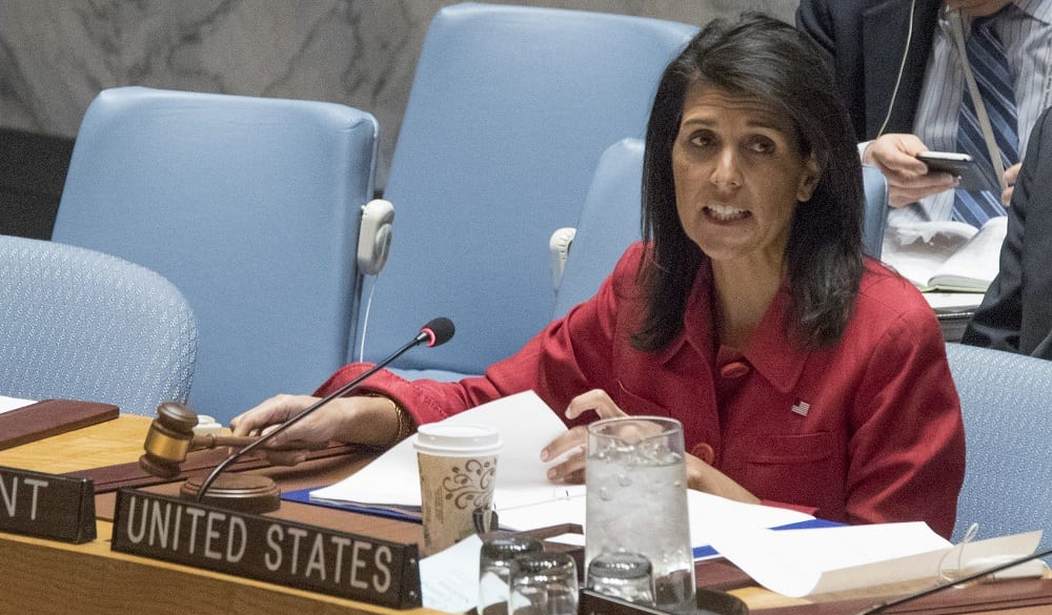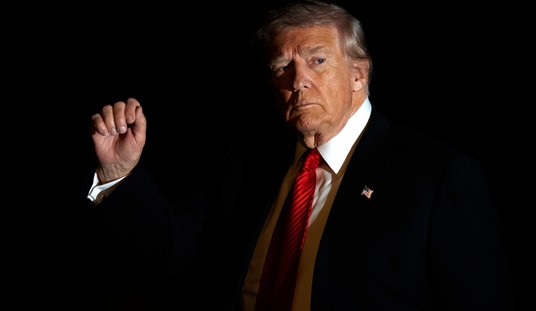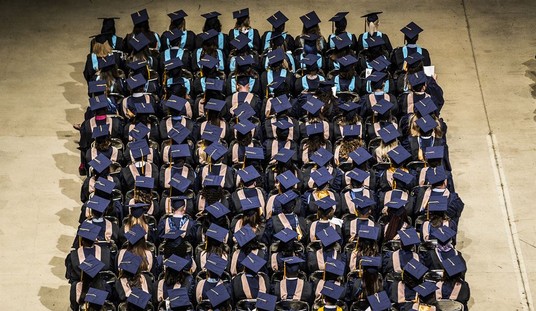The Foundation for Defense of Democracies (FDD) held its National Security Summit today, where United States Ambassador to the United Nations Nikki Haley received an award and spoke on a variety of topics regarding foreign policy.
Haley received the Jeane J. Kirkpatrick Statesmanship Award; according to the FDD’s website, the award is named after the first female U.S. ambassador to the U.N. because of “her opposition to totalitarianism and her defense of American values, in particular the rule of law, basic human rights, and peace through strength.”
The FDD stated that it chose to honor Haley because she “has brought a precise moral compass and a distinctly American voice to the United Nations” and “has been a powerful advocate for human rights, U.S. national security, and U.N. reform.”
The full transcript of Haley’s discussion is available here, with clips and excerpts below.
.@USUN Ambassador Nikki Haley describes why the United States withdrew from the @UN #HumanRights Council. #FDDSummit pic.twitter.com/rPhqrn7pC6
— Department of State (@StateDept) August 28, 2018
HALEY: Well, I think what you saw with the Human Rights Council was –there were no words around it. Literally, the reason the Human Rights Council is in Geneva is because every country that serves in New York, they don’t think human rights is tied to peace and security. So they want it as far away from New York as possible and the truth is human rights, many times if you look at a government, if they don’t take care of their people, you can almost bet it’s going to end up in conflict and something is going to happen.
And so we went in genuinely, wanting to see if we could stay in the Human Rights Council. President Bush just said, we’re not going to join at all. We actually put in the effort and said, can we reform it?
And what we found were there were many countries that were embarrassed by it. Many thought we needed to reform it, but they would only tell me that behind closed doors. They wouldn’t do it out in public.
And so you saw Russia and China oppose greatly, reforms. And so, clearly, the last I think, decision point, was when an ambassador told me that if the United States gets out then that’s all that we have left. There’s no credibility left. Well, that’s exactly why we needed to get out. Because you can’t be the reason that something is given credit and said to be good when Venezuela is on it.
Recently they just appointed the Democratic Republic of Congo, Cuba. You see all of these bad actors that go on the Human Rights Council simply to protect themselves. And so it was a problem and we got out.
But there are multiple things that we have gotten out of that were a deal that were beneficial to other countries but not to us: the Paris Climate agreement, we got out. The Iran deal, we’ve gotten out of. UNESCO was another one that we got out of. What we are now doing — I went to the president one day and I gave him a book. And in that book, I showed him every country and the money we give them and then I showed him the voting sheet and all those things, and I said at some point-it’s not that we should solely look at U.N. voting; that is not what I’m saying.
What we should do is, the countries that we give money to, do they believe what we believe? Are they still actually wanting to be our partner and work with us? If they’re not and they’re shouting, “death to America,” why would we give them a single penny?
And so you are seeing the efforts of defunding those things that are not helpful to us and that don’t — aren’t in the United States interest. And the Human Rights Council and the Office of the Human Rights Commissioner, we are going to make targeted cuts. If there are certain things that are not beneficial to our interests and the things that we fight for, we’re going to get out of it.
.@USUN Ambassador Nikki Haley on anti-Israel bias at the @UN: When I saw how abusive all of these countries were being against #Israel, I had no choice but to get up and say this is completely wrong. We are not going to condone this anti-Israel bias. #FDDSummit pic.twitter.com/oKsLWpfzyv
— Department of State (@StateDept) August 28, 2018
HALEY: I really didn’t even have that decision in my mind. I knew that there was a bias against Israel, but I hadn’t really put a lot of the thought into it until I attended the first session. And when I saw literally how abusive all of those countries were being to Israel in a way that was pathetic, really, I had no choice but to get up and say this is completely wrong.
It’s like that kid in the schoolyard that gets bullied and everybody is bullying the kid just because they think it makes them stronger. I wasn’t going to stand for that.
And so I came out and said we are not going to condone this anti-Israel bias. We started to make sure that the Israel bashing sessions, as I call them, that they have once a month — we now try and talk about –they’re supposed to be sessions on the Middle East, not sessions on Israel. And so now we’re actually making them talk about other areas in the Middle East and how we’re dealing with those.
MAY: There are some other problem areas in the Middle East, last I heard.
(LAUGHTER)
HALEY: And you would not know it if you were at the U.N. And so, we’re starting to do those things and now frankly they’re scared to say anything negative about Israel because they don’t want me to yell at them.
RT @USUN: Great conversation discussing foreign policy and American leadership. #USStrong🇺🇸 #FDD pic.twitter.com/7ixfA6jUBy
— Archive: Ambassador Nikki Haley (@AmbNikkiHaley) August 28, 2018
The views expressed here are those of the author and do not represent those of any other individual or entity. Follow Sarah on Twitter: @sarahmquinlan.













Join the conversation as a VIP Member